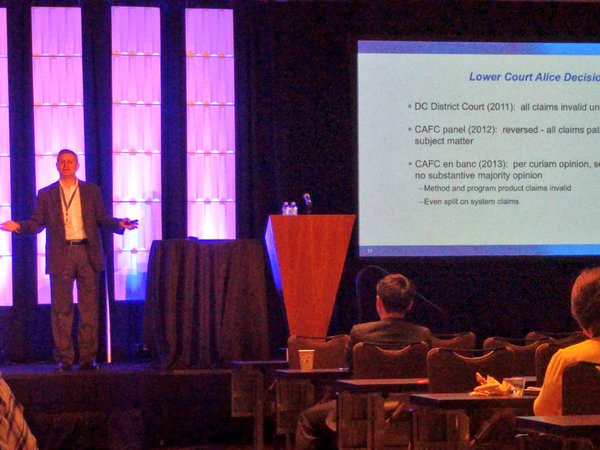And don't forget what David Kappos is doing

Photo credit: Esteban Minero
Summary: IBM's hardheaded attitude and patent aggression unaffected by its strategic acquisition of a company that at least claimed to oppose software patents (whilst at the same time pursuing them)
THE SO-CALLED 'champion' of the U.S. Patent and Trademark Office (USPTO) was, for a number of decades, IBM, based on the number of granted patents.
As IBM takes over Red Hat (not finalised yet) Red Hat could use a reminder that
IBM is hostile to software freedom, free software, sharing etc. because it's a propagandist for software patents and it's aligned with 'IP' extremists' front groups. It's funding them and it's leading them.
Less than a day ago
this article from a site of patent propagandists (pro-patent trolls, pro-UPC, pro-software patents and so on) was published with this summary: "IBM’s Manny Schecter believes public awareness of intellectual property has increased but there has not been a corresponding increase in understanding" (
patents are not property).
He mentioned patents specifically:
On the patent side, people often get confused about various aspects of patents, such as the difference between filing and grant date. “All understandable,” noted Schecter.
Those who are intimately familiar with IP do not necessarily help the situation: a second area of confusion, according to Schecter, comes from the public debate around IP. “We argue vigorously for positions in the intellectual property world, and we have a tendency to use a lot of rhetoric and take a lot of extreme positions in trying to make our point,” said Schecter. “Sometimes we actually want that extreme position and sometimes we are just trying to get our point across.”
Schecter urged the audience to close the gap between awareness and understanding by increasing the level of understanding. “We have to figure out how to optimise the benefit of intellectual property,” he said.
Schecter believes that people who say that intellectual property is somehow hurting innovation are really saying is it is not achieving its optimum promotion of innovation.
“If we are actually going to get people understanding intellectual property we have to overcome confusion, we have to overcome misinformation, we have to overcome our own rhetoric and we have to overcome pressure from our clients. Just speak honestly and respectfully. Our innovation economy, our national security, frankly our everyday creature comforts may depend on it,” he said.
Earlier this week the IBM-led (still IBM-centric) Open Invention Network, which is also a booster of software patents,
added Alibaba and Ant Financial as members. But rather than add members shouldn't these people work to abolish software patents? They're ridiculous! There are, as it turns out, even patent on numbers. At first we thought this was merely satirical, maybe parody. But as
this new tweet shows (there's a picture there): "In 1994, Roger Schlafly, trying to showcase the flaws of US Patents, patented two primes. These primes were used to improve modular division thus saving a lot of time in the Diffie-Hellman method for public-key encryption - critical to secure lots of Internet services at the time..."
Just pay the fee and the monopoly is yours.
The Open Invention Network's CEO said he was "looking to bring in more Chinese companies," even if membership is of
no use against patent trolls and it merely legitimises software patents. To quote
this short new report:
OIN is the largest patent non-aggression community in history. It supports the freedom of action in Linux as a key element of open source software. It is funded by Google, IBM, NEC, Philips, Red Hat, Sony, SUSE and Toyota.
In a recent interview with IPPro, OIN CEO Keith Bergelt said the organisation was looking to bring in more Chinese companies and that in 2018, the total number of OIN licensees “has eclipsed the total number of Japanese licensees”.
According to OIN, as a global leader in ecommerce and cloud computing and a global leader in financial technology, respectively, Alibaba and Ant Financial are “demonstrating their commitment to open source software as an enabler of their platforms and systems”.
They are demonstrating their commitment to patents; there are much better solutions than OIN (more on that in our next post), but large members of OIN aren't interested in these. Companies like IBM and Microsoft try to shield their software patents or cross-license these under the 'umbrella' which is OIN. But such patents should not at all exist in the first place. Moreover, being a member of OIN did not prevent IBM from
feeding Microsoft-funded patent trolls.
⬆

